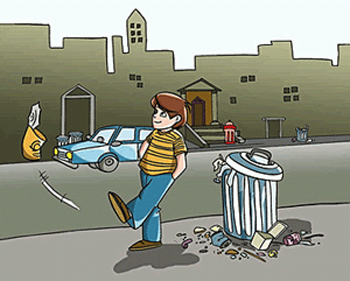-ance, -ancy
(Latin: often through French, quality or state of; being; condition; act or fact of _______ ing; a suffix that forms nouns)
2. Anything which surrounds or encompasses a surroundings: The ambience of candles, comfortable furniture, and soft music increased the pleasure of being in Lydia's and Patrick's living room in the evening.

2. Formerly a field hospital; that is, on a field of battle where the wounded were carried out on stretchers, etc. by "walking bearers".
The term ambulance was borrowed from French hopital ambulant, mobile hospital, or literally, "walking hospital," from Latin ambulantem and ambulare, "to walk."
Historically, soldiers wounded in battle usually stayed where they fell until it was dark or until the end of some particular combat when they could be carried or dragged off for treatment.
This situation didn't change until 1240, when Italy's Misericordia di Firenze, the first known emergency-care service, was founded.
Although primitive horse-drawn conveyances for the wounded made occasional appearances—at the Battle of Málaga in 1487, for example—it wasn't until 1792 that ambulances became a regular part of the battlefield scene.
It was at this time that Baron Dominique-Jean Larrey, a French army surgeon, introduced what he called the ambulances volantes, or "flying field hospitals". Such conveyances were covered, portable litters filled with bandages to stop the flow of blood and to bind the wounds of soldiers on the battlefield. The transporter was also called the hopital ambulant; that is, "walking hospital" or "traveling hospital."
The English borrowed this idea and the name; however, they dropped the first word and anglicized the second so that today the vehicle used to transport the sick or wounded is now called an ambulance, even though neither it nor its patients are "ambulatory" and are certainly "not ambulating".
One of the first modern ambulances appeared during the American Civil War, when Dr. Jonathan Letterman, medical director of the Army of the Potomac, assigned two horse-drawn ambulances to every regiment of 500 infantrymen. The Geneva Convention, in 1864, recognized military ambulances, declaring that the vehicles, the wounded they carried, and the medics that operated them, should be considered and treated as neutrals.
2. The act of troubling or annoying someone.
3. Something or someone that causes trouble; a source of unhappiness.
4. Anger produced by some irritation.
5. An unpleasant person who is annoying or exasperating.
6. The psychological state of being irritated or annoyed.
"Appurtenances also include equipment or gear; such as, clothing, tools, or instruments, that are used for specific purposes or tasks."
2. An offensive display of superiority or self-importance: The group was shocked by the arrogance of Mildred's comments during the meeting.
2. Number present, audience, crowd: "The attendance at the game was over 75,000."
2. The act of keeping away from somebody or something.
3. The act of refraining from doing something or preventing it from happening.
4. In law, the act of making something invalid.
5. A conscious or unconscious defense mechanism consisting of refusal to encounter situations, activities, or objects that would produce anxiety or conflict.
2. The quality of being magnificent, splendid, or grand.
2. Splendor; glitter; great brightness.


